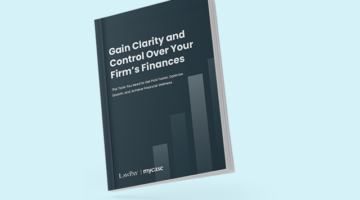 On June 28, 2019, the Task Force On Access Through Innovation Of Legal Services, a committee appointed by the State Bar of California Board of Trustees, met to discuss proposals to change the rules regarding legal practice to address the access to justice problem.
On June 28, 2019, the Task Force On Access Through Innovation Of Legal Services, a committee appointed by the State Bar of California Board of Trustees, met to discuss proposals to change the rules regarding legal practice to address the access to justice problem.
At the end of the day, the task force made a number of recommendations. Here are some of the more controversial ones:
- Allowing non-lawyers to deliver legal services.
- Allowing non-lawyers to have an ownership interest in law firms.
- Allowing technology-driven legal systems to provide legal advice.

Best Practices In Trust Accounting: What Every Lawyer Needs To Know
Learn legal trust accounting best practices to ensure compliance and protect client funds. Discover expert tips to set your firm up for success.
All of the above will be allowed with proper regulation which has not been specified at the meeting.
The debate over letting non-lawyers practice is nothing new. The rationale is to increase access to justice for those who cannot afford to pay an attorney. The assumption is that allowing non-lawyers to enter the legal marketplace will increase supply and will incentivize cost reduction.
In 2013, the ABA Task Force On The Future Of Legal Education in its report recommended that access to justice can be improved by allowing non-lawyer technicians to practice law in certain cases. And Washington state has implemented a limited license legal technician program in 2012.
The task force’s proposed amendments to the rules would not only allow licensed technicians but would also allow “technology-driven legal systems” to practice law. The task force made it a point to state that regulated entities that are permitted to practice law should not be limited or restrained by any concept or definition of artificial intelligence. This seems to suggest that artificial intelligence should be allowed to give legal advice once the technology is available and is properly regulated.

Take Control Of Your Firm’s Finances With Tools Built For Success
Position your firm for long-term growth with better financial visibility and control. Learn how to track performance, manage spending, and plan strategically—download the full e-book now.
It appears that not many California lawyers know what’s going on. To my knowledge, the California Lawyers Association has not issued a statement about this. When I brought this up to colleagues, most did not know about this meeting. This is unsurprising since most solos and small-firm lawyers do not regularly check the California State Bar website. Most of us go to the state bar website for four reasons: to pay annual dues, look up opposing counsel, check if their law clerk, relative, or friend has been admitted to the bar, or to see who got disbarred and why.
If non-lawyers are allowed to practice, it is very likely to affect solo and small firms the most as they tend to serve the low-income/middle class market. The public will have little sympathy because they think that all lawyers are rich and greedy. What people don’t know is that self-employed lawyers — like any other business -– have to pay bills and because of this, even the most frugal and selfless attorney can only reduce their prices by so much. This includes office overhead, staff, online research access, and bar dues. And lawyers usually pay more these things than others because again, everyone thinks lawyers are rich. And most lawyers have to pay nondischargeable student loans where balances seem to increase with every graduating class.
Proponents of alternative business structures or technology-driven legal systems argue that they are trying to service those who cannot afford an attorney. But I’m sure they wouldn’t mind accessing a much bigger consumer market: those who can afford an attorney but don’t want to pay for one.
If the task force’s proposals pass, I question whether this will result in limited license non-lawyers opening up shop in remote parts of California. Instead, it will open the door for venture-capital-funded startups to set up AI powered legal self-help websites. People can access these sites with their legal questions or issues and artificial intelligence will provide the answers and probably the documents as well.
Or this can result in the creation of “Uberlaw” where a website connects the client with the attorney. But the website will set the price and the terms of the attorney-client relationship. And if the client gives the attorney less than five stars, the lawyer can be removed. Meanwhile, the lawyer will still be responsible for her overhead and will be responsible if something goes wrong.
The proposals can affect the big players as well. The Big 4 accounting firms would love to enter the legal market so they can service their existing Fortune 500 clientele. Their tax departments already hire lawyers for consulting and compliance work. This might be of particular interest to Arthur Andersen. Yes, that Arthur Andersen who had a major role in the Enron scandal although I think their current staff had nothing to do with it. They are now trying to revive the brand by promoting their legal advising services.
Finally, despite assurances of regulation, there may be some who will use this opportunity to scam the public. A well known example is the notario, a nonlawyer who offers legal services in Hispanic community. Hispanic immigrants confuse them with “notario publico,” a person with extensive legal training in most Latin American countries. The California State Bar has warned immigrants to be careful when dealing with unlicensed notaries. Also, during the housing crisis, nonlawyers set up loan modification shops. They promised customers that they can save their homes from foreclosure and can set up loan modification agreements where the principal is reduced. The nonlawyers owners of these companies hired lawyers (usually new graduates) to negotiate with the banks. Most of these shops were shut down and the lawyers involved had their licenses suspended or were disbarred.
The task force’s proposals to expand who is allowed to practice law in California is something that every lawyer should know about. The California State Bar Board of Trustees will meet on July 11, 2019, to review these proposals and they will invite public comment for 60 days. It should not be ignored thinking that it will go away if nobody cares. Even if you don’t live in California, you might want to keep an eye on this because your state might be next. I’m looking at New York in particular. This can result in non-lawyers owners telling the lawyers how to do their job which was the main concern when the ABA prohibited fee-splitting and nonlawyer ownership. Also, most trench lawyers know firsthand how some of their clients have been hurt because they turned to unqualified people. Their stories must be told as a warning.
Steven Chung is a tax attorney in Los Angeles, California. He helps people with basic tax planning and resolve tax disputes. He is also sympathetic to people with large student loans. He can be reached via email at [email protected]. Or you can connect with him on Twitter (@stevenchung) and connect with him on LinkedIn.